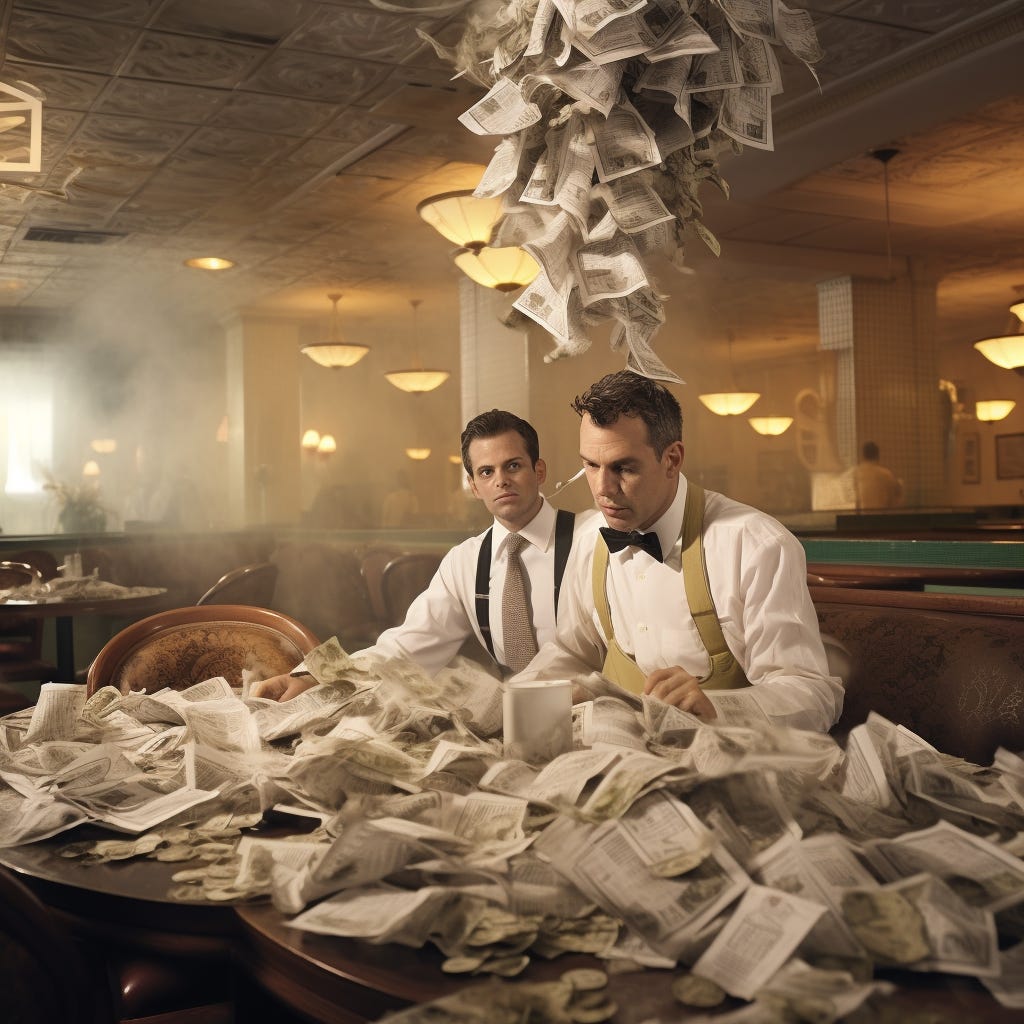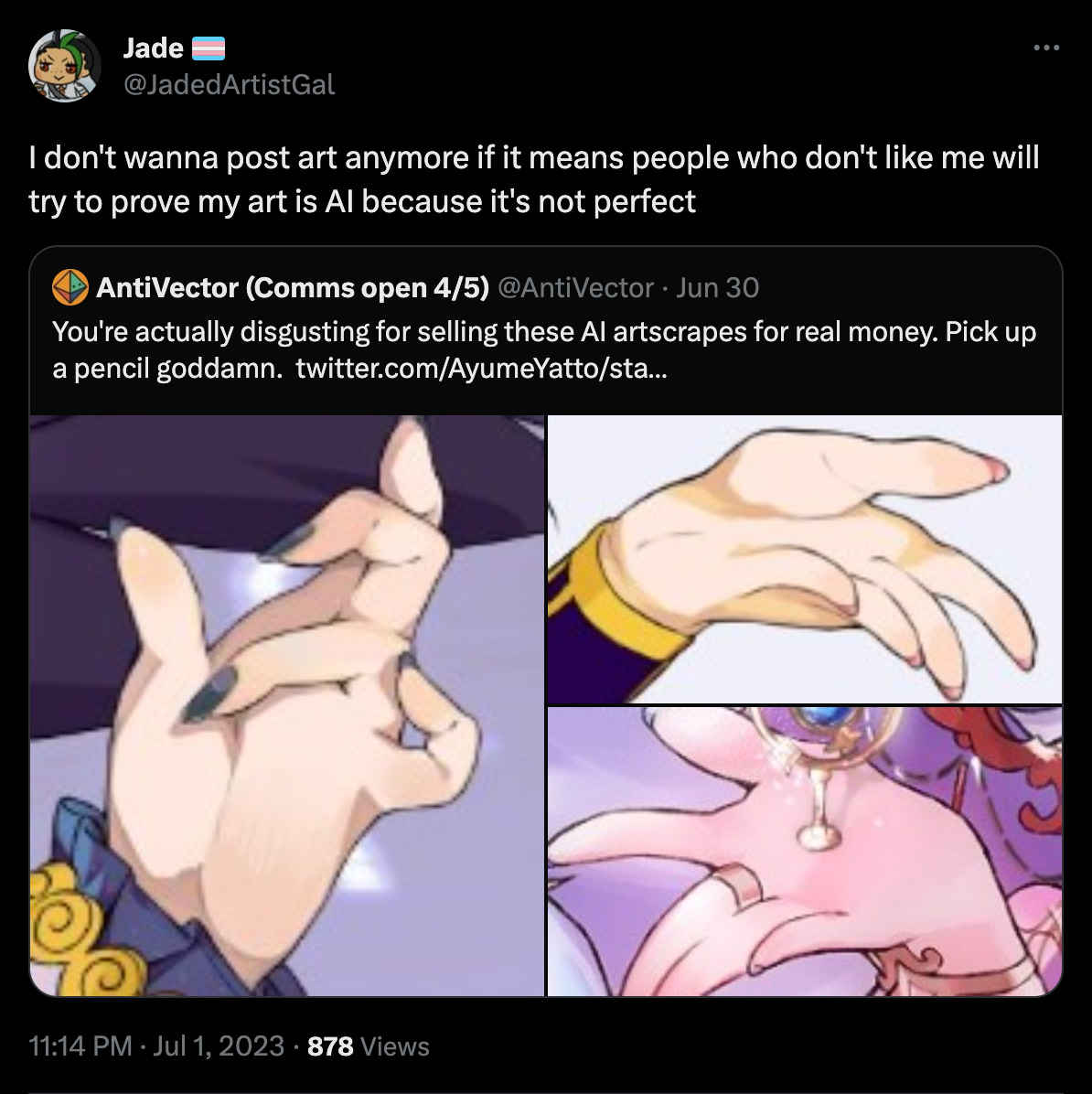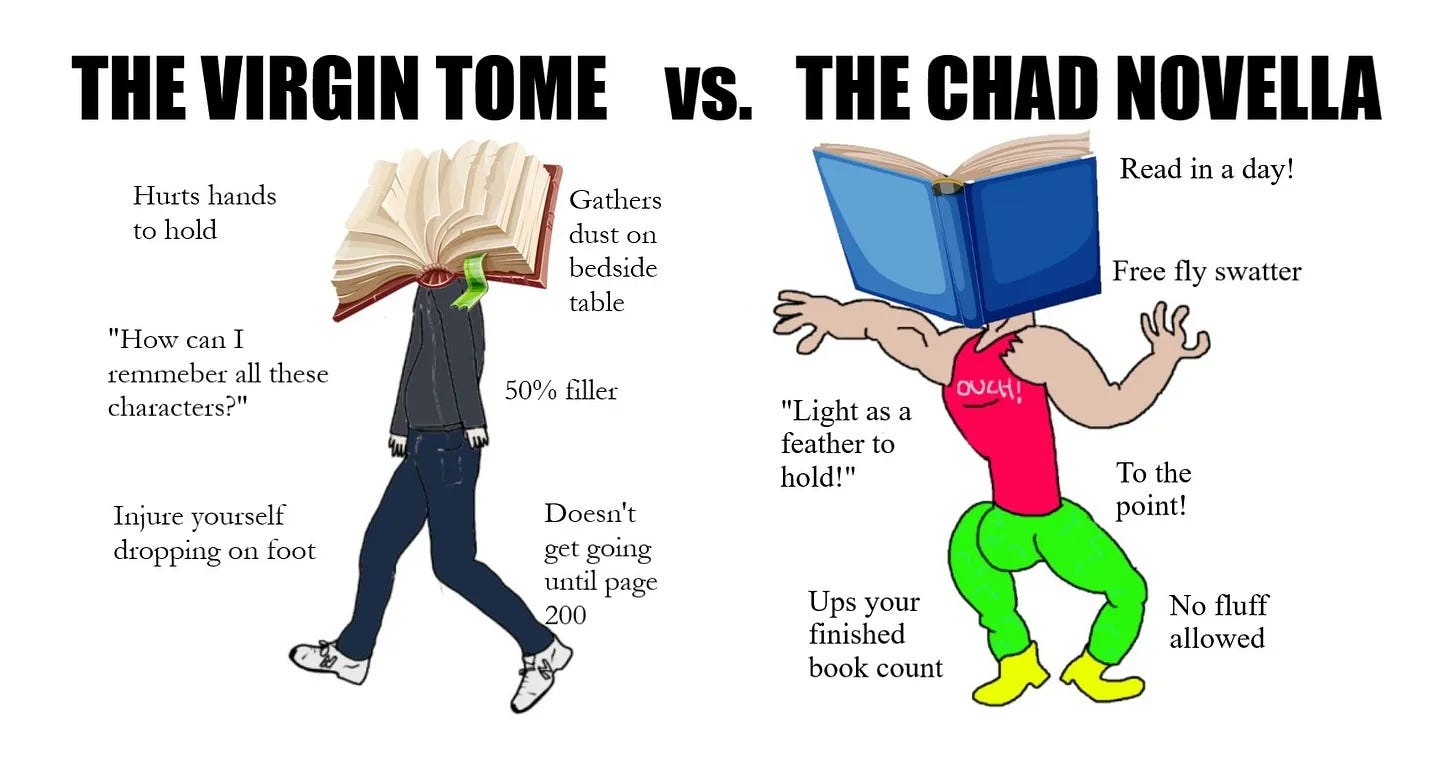The Prisoner's Dilemma of USA Restaurant Fees
Also: judging flaws as inhuman, the rise of novellas, and the vegas sphere
In the USA, who *actually* knows what you are going to pay on a restaurant bill? It feels like it’s getting worse.
I stumbled upon this post in a local news blog in DC. Mi Vida (which has great food btw), decided to add a fee to their bills because of an initiative that was passed this year in DC, to bring the minimum wage in line for tipped workers.
A tipped worker’s wage consisted of both their hourly wage + tips. If the combined total was underneath the actual minimum wage, the establishment would have to cover the rest. This has now changed with initiative 82 and the hourly wage will go up until 2027, at such time, the tips would then amount to being purely a bonus to their wages.
Faced with this situation, restaurants either absorb the costs or raise their prices. But… what Mi Vida did here was sneak it in as an extra fee at the end of the bill. They are doing the latter: raising prices, but by not changing the menu and the posted prices.
Similarly, I noticed this at another establishment in DC, The Hamilton, which in 2023 added their own surcharge.
Our restaurants have been operating with extraordinary increases in the cost of doing business. High inflation, rising wages and supply chain challenges have continued beyond the pandemic creating a difficult operating environment. We have reluctantly chosen to implement a separate 3.75% fee for 2023 with the hope that it can be eliminated in the future as conditions improve. We appreciate your support and understanding.
The problem is, is that the restaurants are clearly facing a conundrum when costs rise: change the menu prices OR slide in a fee that you see only once you sit down or when you see the bill. Perhaps, just enough, to ensure that they don’t run foul of misleading the customer. I understand why they choose to do it this way, because it’s a lose-lose game. If you raise you menu prices first, then you are likely to lose customers (vs other establishments). So, if you keep the menu prices the same, but get people in the door, and THEN add that sneaky charge, they are more likely to stay (and pay, begrudgingly).
Ultimately, it will backfire eventually, as customers feel duped. The top comment on the article reveals customer sentiments.
This is all political posturing.
If rents go up, they don't add a "rent increase surcharge," they just add the cost to the price of their food.
If the cost of cleaning products goes up, they don't add a "clean kitchens fee," they just add the cost to the price of their food.
If their old plumbing gets more expensive to maintain, they don't add a "pipe integrity surcharge," they just add it to the cost of the food.
If their accounting firm raises their prices, they don't add a "financial management fee," they just add it to the cost of their food.
But when the government makes them pay their service staff more, they keep their food prices the same and add a government policy surcharge. That way, they can say "See, we warned you, this darn government policy made your costs go up. Shame, isn't it? Better call your councilmember."
Unfortunately, it feels like the US is uniquely inadequately equipped to deal with this. Other countries have fixed this. For example, in South Africa, the Consumer Protection Act specifically points to issues where the advertised prices doesn’t actually match what you are expected to pay.
Right to protection against bait marketing
1. Suppliers are not allowed to lie to consumers about the price, description or benefits of goods or services.
2. Suppliers are not permitted to mislead consumers in respect of pricing, the nature, properties, advantages or uses of goods or services advertised, if such goods or services are not actually available for purchase or procurement in accordance with these standards.
3. Suppliers must not advertise goods as being available at a certain price when they are not.
The fundamental problem in the US is that it stems from the fact that consumers are already used to the fact that what they see isn’t what they actually pay. Posted prices do NOT include the sales tax (which differs between states and regions). So, yes, you pay more than what’s on the sticker. On top of that, 15-20% is expected as gratuity on restaurant bills. So, more often than not, you do NOT actually know what you need to pay from just looking at the menu. Another trend is restaurants that already add the gratuity INTO the bill and then add ANOTHER section for more tip. It keeps ballooning, all away from just raising the posted prices on the menu.
Practically, it’s not that hard to just ensure that the posted price is all inclusive of all fees. But, unless everyone is going to do it, no one will… And thus, you have a classic prisoner’s dilemma that’s made easier to defect (in not raising posted prices) by the fact that hidden fees already exist. What’s an extra few percent when no one knows what the final bill will be anyway?
The US doesn’t have federal sales taxes, but at the very least, it could impose consumer protection acts *somewhere* to ensure that posted prices match what you are actually going to pay. I call it the FEE Act. Fees Exactly as Expected Act. Who’s with me? 😅
I’m curious if there are examples from other countries? Have you seen this?
Your Flaws Become Inhuman
In one of my first newsletters, in January, I wrote about the conundrums of banning AI.
By fearing AI, resorting to detecting and banning it, we indirectly serve judgement on ourselves. We say that we are inadequate. Yes, we want to talk to humans, not bots. Yes, and we also want to experience works made by humans over AI, but in creating this distinction, we judge the works of others, not based on its merits, but whether it’s human or inhuman. And that, feels dangerous.
…and again:
If the automated systems to detect AI fail, but we believe it to be inhuman, is it our place to judge the humanity of the work? Who, after all, wants their work to be judged to be inhuman?
It came true this week, when someone went on a witch hunt, calling out a long-time artist for using AI. In turn, seeing this happen, it caused its own backlash among artists, fearing this same rejection: of pointing out a flaw to be inhuman.
I understand that impulse to want this to all, in turn, to go away, to go back to a point where AI generation does not exist AND one’s work would then not be scrutinised in turn to be inhuman… but, at what cost? The cat’s out of the bag.
Interestingly… a perspective I had not considered is that our strong modern beliefs about plagiarism, strong copyright protection is actually relatively modern, which in turn brings me to:
Imitation and Style in Art History
I don’t know my art history well enough to corroborate this, but in principle, it makes sense. Imitation has been a long held tradition of the arts and AI is reviving it.
There is therefore a certain irony in that the latest avatar of electronic technologies may now foster a revival of art theory tropes that twentieth-century modernism tried to eliminate from the visual culture of the machine-made environment. Imitation and style, which modernists had rejected from art theory, are coming back to art practice through the window of technology.
and then…
Out of this realization came, over time, an entire encyclopedia of aesthetic and cognitive theories aimed at honing and promoting the best practices of imitation. As technology now begins to automate imitation, thus endorsing and generalizing its uses, we must revive some critical awareness of what imitation means, how it works, and how we can work with it. As with all tools, artificial intelligence, whether generative or not, can only be as intelligent as the tasks to which we put it.
It’s definitely left me with an interesting thread to follow. My initial thoughts makes me wonder that perhaps with the trends during the late 1900s of stronger copyrights + globalization + neoliberal capitalism + post-modernist self-reflection + emphasis on the individual, that the concept of imitation as an art practice were rejected. Is this the right rabbit hole? Do you have any insights on this? Where’s my art history readers? :)
ht misha
The Honolulu Skyline
This was a fun video introducing the new Honolulu Skyline transport.
I dig it. :)
Speaking of new construction…
The Vegas Sphere
I’m madly in love with this insane project.
Last year, I really enjoyed this video from B1M about the Vegas Sphere.
Enjoy!
What I’ve always liked about Vegas is that: what you see is what you get. It’s unabashed in its expression. Hedonism in a desert. I wish there’s more of this being built. Just more development of everything in general.
How Novellas Became Novels
Slowly learning more of the book publishing industry and kind of surprised how novellas has been historically shunned. Nowadays, it’s gaining popularity.
I like novellas, and they don’t even need to be bundled. I just love how they feel. I honestly think one of the reasons for this has been the Kindle. One gets used to a slimmer form factor. So, you get slimmer novels, which feels nicer, but you still get the nice tactile feel of paper in your hands. It feels like a companion to me. For example, I’m travelling this week and I’m busy reading ‘Tomorrow, Tomorrow, and Tomorrow’ hardcover which is just too big to carry along with me. If it was a novella or smaller paperback, it would’ve been easier.
The Airbnb Collapse
This was bound to eventually happen.
Coupled with rising interest rates, if these properties were bought with variable rates, it’s likely underwater. There was a period where I loved booking airbnbs and will probably look at doing so if it’s with a large group, but if it’s just me and fiancee, nope. I enjoy the predictability of hotels.
Have you moved between these in the past?
Google Death’s by a thousand cuts
An impending dark forest is coming as data retreats to their corners of the web. If it’s public, it will eaten by an LLM. The unfortunate outcome is that search will keep getting worse.
One by one, search results become dead links and are removed from the index. Users will start to rely on site-specific searches behind walled gardens. The first page of search results will not only be filled with ads but will be missing key results. Google may try to augment results with AI-generated answers, but (1) not all of these answers will be good enough, and (2) the data needed to train these answers will increasingly be found behind login or paywalls. Search might progressively get worse over the years until a new alternative arises.
ht Jeremy
Serving Legal Action Through NFT Airdrops
This isn’t new, but I’m surprised that this actually holds up as a practice. Last year, UK said that you CAN actually serve suits through an NFT airdrop.
Because the addresses are pseudonymous, there’s no way to notify people of being able to participate in class action suits. Getting notified of a class action lawsuit through an airdrop is still wild, though.
ht Rick
Thool - Tepeu
I find this week’s song hard to describe. It’s ambient, house-ish, 80s in parts, but also modern? Either way, it’s a vibe.
Enjoy! Catch a sunset, and see you all next week!
Simon
PS. I’ve officially been doing this 26+ issues. Half a year! If you enjoy this newsletter, please share it with friends who might appreciate it. The more the merrier.









